At the equinoxes (both of them) day and
night were equal in duration. Although the
distance from March 21 to September 22 was
longer than half a year and the distance
from September 22 to March 21 was shorter than
half a year:
|
March |
21 |
80 |
0 |
|
31 |
90 |
10 |
|
April |
30 |
120 |
40 |
|
May |
31 |
151 |
71 |
|
June |
21 |
172 |
92 |
|
30 |
181 |
101 |
|
July |
31 |
212 |
132 |
|
August |
31 |
243 |
163 |
|
September |
22 |
265 |
185 |
|
30 |
273 |
193 |
|
October |
31 |
304 |
224 |
|
November |
30 |
334 |
254 |
|
December |
21 |
355 |
275 |
|
31 |
365 |
285 |
|
January |
31 |
31 |
316 |
|
February |
28 |
59 |
344 |
|
March |
21 |
80 |
365 = 185 + 180 |
|
31 |
90 |
375 |
And counting with the March equinox as
day 79 (444 = 365 + 79 → 344 = 265 + 79) would make the difference even
greater:
|
March equinox = 79 |
185 |
Sept 22 |
363 - 185 |
March 20 |
|
265 |
444 |
|
186 |
179 |
|
Northern summer |
Northern winter |
|
Soutern winter |
Southern summer |
...
Ecclesiastically, the equinox is
reckoned to be on 21 March (even
though the equinox occurs,
astronomically speaking, on 20 March
[*364] in most years) ...
A circle drawn on the flat surface of the
earth measured twice 180°
- except by the ancient Chinese who
instead used the measure 365¼°.
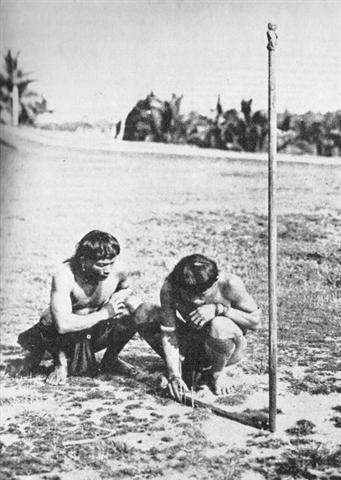
Presumably this was one reason why the C text
was designed to measure out 6 days at its beginning:
|
no glyph |
koia |
ki te
hoea |
ki te henua |
te rima te hau tea |
haga i te mea ke |
ki te henua - tagata
honui |
|
Ko.
1. Article (ko
te); preposition:
with (see grammar);
prefix of personal
pronouns: koau,
I; kokoe, you
(singular); koîa,
he, she, it; kokorua,
you (plural); ko
tagi, koîa, he with
his weeping. 2. Article
which precedes proper
nouns, often also used
with place names: Ko
Tori, Ko Hotu Matu'a, Ko
Pú.
Koîa, exact:
tita'a koîa, exact
demarcation. Seems to be
the personal pronoun
koîa - applied in
the meaning of: thus it
is, here it is
precisely.
Vanaga. 1. Negative;
e ko, not, except;
e ko ora,
incurable; ina ko,
not; ina ko tikea,
unseen; ina e ko,
not; ina e ko mou,
incessant. 2. A particle
used before nouns and
pronouns; ko vau,
I; ko te, this;
ko mea tera,
this; ati ko peka,
to avenge, ko mua,
first, at first,
formerly. 3. There,
yonder. P Mgv.: ko,
over there, yonder. Ta.:
ó, there, here.
Churchill.
Hoe.
Hoe 1. Paddle. Mgv.:
hoe, ohe,
id. Mq., Ta.: hoe,
id. 2. To wheeze with
fatigue (oeoe 2).
Arero oeoe, to
stammer, to stutter;
Mgv. oe, to make
a whistling sound in
breathing; ohe, a
cry from a person out of
breath. Mq.: oe,
to wheeze with fatigue.
3. Blade, knife; hoe
hakaiu,
clasp-knife, jack-knife;
hoe hakanemu,
clasp-knife; hoe
pikopiko, pruning
knife. 4. Ta.: oheohe,
a plant. Ma.:
kohekohe, id.
Churchill.T. Paddle.
E hoe te heiva =
'and to paddle (was
their) pleasure'. Henry.
Hoea, instrument
for tattooing. Barthel.
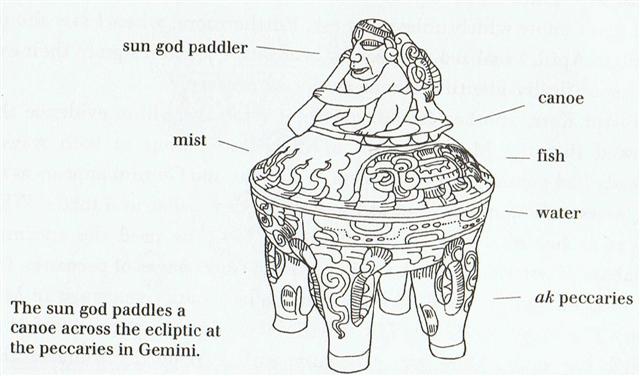 |
|
JULY 19 |
20 |
21 (202) |
22 |
23 |
24 (199 + 6) |
 |
 |
 |
 |
 |
 |
|
Ca1-1 |
Ca1-2 |
Ca1-3 |
Ca1-4 |
Ca1-5 |
Ca1-6 |
|
Sept 20 (263) |
21 |
Equinox |
23 (266) |
24 |
25
(84 + 184) |
26 |
|
ALCHITA
= α Corvi,
MA WEI (Tail of the
Horse) =
δ Centauri
(183.1),
MINKAR = ε Corvi
(183.7), ρ Centauri
(183.9) |
PÁLIDA (Pale) = δ Crucis
(184.6),
MEGREZ (Root of the
Tail) = δ Ursae Majoris
(184.9) |
Hasta-13 (Hand) /
Chariot-28 (Worm)
GIENAH
(Wing) = γ Corvi
(185.1),
ε
Muscae (185.2),
ζ Crucis (185.4),
ZANIAH (Corner)
= η Virginis
(185.9)
*144.0 = *185.4 - *41.4 |
CHANG SHA (Long
Sand-bank)
= ζ Corvi
(186.3) |
INTROMETIDA (Inserted) =
ε Crucis (187.4),
ACRUX = α Crucis
(187.5)
*146.0 = *187.4 - *41.4 |
γ
Com. Berenicis (188.0),
σ
Centauri (188.1),
ALGORAB = δ Corvi
(188.5),
GACRUX =
γ Crucis
(188.7) |
γ
Muscae (189.0),
AVIS SATYRA (Bird of the
Satyrs) = η Corvi
(189.3),
ASTERION (Starry) = β
Canum Ven.
(189.5),
KRAZ = β
Corvi,
κ Draconis (189.7) |

... Raven gazed up and
down the beach. It was
pretty, but lifeless.
There was no one about
to upset, or play tricks
upon. Raven sighed. He
crossed his wings behind
him and strutted up and
down the sand, his shiny
head cocked, his sharp
eyes and ears alert for
any unusual sight or
sound. The mountains and
the sea, the sky now
ablaze with the sun by
day and the moon and
stars he had placed
there, it was all
pretty, but lifeless.
Finally Raven cried out
to the empty sky with a
loud exasperated cry.
And before the echoes of
his cry faded from the
shore, he heard a
muffled squeak. He
looked up and down the
beach for its source and
saw nothing. He strutted
back and and forth,
once, twice, three times
and still saw nothing.
Then he spied a flash of
white in the sand.
There, half buried in
the sand was a giant
clamshell. As his shadow
fell upon it, he heard
another muffled squeak.
Peering down into the
opening between the
halves of the shell, he
saw it was full of tiny
creatures, cowering in
fear at his shadow ... |
... An oracle reached him
from the town of Buto, which said
'six years only shalt thou live upon this
earth, and in the seventh thou shalt end thy
days'. Mycerinus, indignant, sent an
angry message to the oracle, reproaching the
god with his injustice - 'My father and
uncle,' he said 'though they shut up the
temples, took no thought of the gods and
destroyed multitudes of men, nevertheless
enjoyed a long life; I, who am pious, am to
die soon!' There came in reply a second
message from the oracle - 'for this very
reason is thy life brought so quickly to a
close - thou hast not done as it behoved
thee. Egypt was fated to suffer affliction
one hundred and fifty years - the two kings
who preceded thee upon the throne understood
this - thou hast not understood it'.
Mycerinus, when this answer reached him,
perceiving that his doom was fixed, had
lamps prepared, which he lighted every day
at eventime, and feasted and enjoyed himself
unceasingly both day and night, moving about
in the marsh-country and the woods, and
visiting all the places he heard were
agreeable sojourns. His wish was to prove
the oracle false, by turning night into days
and so living twelve years in the space of
six ...
150 (affliction) + 210 = 360. The
ancient Egyptians counted their
years as 360 days.
392 (number of glyphs on side a of
the C tablet) - 6 = 386 = 150 + 236
(8 * 29½).
Glyph 6 (September 26) + 150 is
followed by the so-called Moon
calendar. I.e., the beginning of this calendar was
evidently placed at right ascension
day *314 / 2, which at the time of
the Bull would have been in the day
after the December solstice.
*157 (Ca6-17) - *64 (precessional
depth down to the time of the Bull)
= *93 (day 173), at which time the
Full Moon would (ideally) have been
observed close to the end of
the Extended Net in night number 173 + 183 =
356 (DECEMBER 22):
|
150 |
22
(6 + 350 = 355 + 1) |
23
(200 + 157) |
DEC 24
(2 * 179) |
25
(199 + 160) |
 |
 |
 |
 |
|
Ca6-17 (314 / 2) |
Ca6-18
(2 * 79) |
Ca6-19 |
Ca6-20 (160) |
|
tagata oho rima - ki te
marama |
koia kua oho |
ki te marama |
kua moe |
|
Aug 25
(237)
Extended Net-26b (Ox)
μ Hydrae
(157.1) |
Maru-sha-arkat-Sharru-15
(4th Son behind the King)
SHIR (Possessing Luminous
Rays)
=
ρ
Leonis
(158.9) |
Aug 27
p Carinae
(159.3) |
Aug 28 (240)
φ Hydrae
(160.3) |
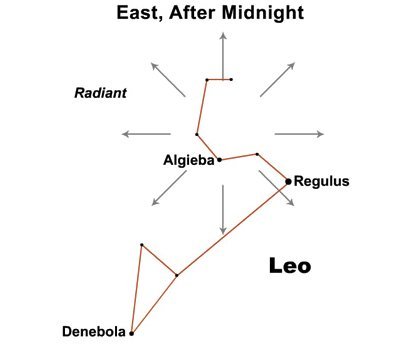
... From
a point a little to the west
of ζ
[Adhafera, ζ
Leonis] and not much farther
from γ
- when first observed the
radiant point was in Cancer
- issue the Leonids,
the meteor stream of
November 9th to 17th, its
maximum now occurring on the
13th to 14th, which about
every thirty-three years has
furnished such wonderful
displays, the last in 1866
and the next due in 1899.
Their first noticed
appearance may have been in
the year 137, since which
date the stream has
completed fifty-two
revolutions. According to
Theophanes of Byzantium, the
shower was seen from there
in November, 472; but the
late Professor Newton, our
deservedly great authority
on the whole subject of
meteors, commenced his list
of the Leonids with their
appearance on the 13th of
October, 902, the Arabian
Year of the Stars, during
the night of the death of
King Ibrahim ben Ahmad, and
added: It will be seen that
all these showers are at
intervals of a third of a
century, that they are at a
fixed day of the year, and
that the day has moved
steadily and uniformly along
the calendar, at the rate of
about a month in a thousand
years ...
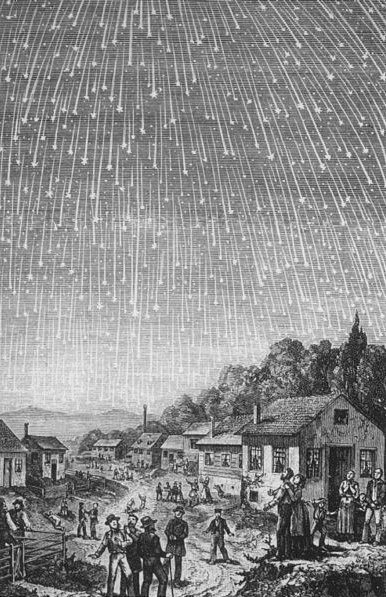 |
If the constellations had been fixed
at their proper positions in the Sun
calendar according to the epoch of
the Bull, then the Extended Net
would have stretched from NOVEMBER
26 (330) to DECEMBER 22 (356).
|
NOV
24 (199 + 129 = 328) |
25
(210 - 64 = 146) |
26 |
27 (148 = 331 - 183) |
 |
 |
 |
 |
|
Ca5-24 |
Ca5-25
(130) |
Ca5-26 |
Ca5-27 |
|
tuu te rima i ruga |
etoru kahi |
|
Āshleshā-9 (Embrace) /
Willow-24 (Stag)
π¹ Ursa Majoris,
δ HYDRAE (129.6),
AL MINHAR AL SHUJĀ
= σ Hydrae,
MUSEIDA
= π² Ursae Majoris
(129.9)
RAS ALHAGUE (α Ophiuchi) |
Al Nathrah-6 (Gap)
BEEHIVE (Exhalation of Piled-up Corpses)
= ε Cancri,
η Pyxidis (130.4),
XESTUS = ο Velorum
(130.5), ζ Pyxidis (130.7),
ASCELLUS BOREALIS = γ Cancri, β Pyxidis (130.9)
*89.0 = *130.4 - *41.4 |
Extended Net-26a (Ox) /
Arkū-sha-nangaru-sha-shūtu-12
(Southeast Star in the Crab)
η
Hydrae (131.0),
ASCELLUS AUSTRALIS =
δ
Cancri
(131.4),
KOO SHE (Bow
and Arrow)
=
δ
Velorum
(131.6),
α
Pyxidis (131.8),
ε
Hydrae (131.9)
*90.0 = *131.4 - *41.4 |
ι Cancri (132.0),
ρ Hydrae (132.4)
*91.0 = *132.4 - *41.4 |
|
... He is bound to it with
willow
thongs in the 'five-fold
bond' which joins wrists,
neck, and ankles together
...

... They
were Ranginui, the
Sky Father, and
Papatuanuku, the Earth
Mother, both sealed together
in a
close embrace.
Crushed between the weight
of their bodies were their
many children, whose
oppression deepened. They
yearned to be free; they
fought their parents and
each other to break loose.
Tuumatauenga, virile
god of war, thrust and
shouted; Tangaroa of
the oceans whirled and
surged;
Tawhirirangimaatea,
Haumiatiketike and
Rongomatane, of wild
foods and cultivated crops,
tried their best but were
not successful; and
Ruamoko, god of
earthquakes, yet to be born,
struggled in the confinement
of his mother's womb ... Of
them all, Taane Mahuta
[cfr Mahute, Boussonetia
papyrifera], the god of
the forests, was the most
determined; he set his
sturdy feet upon his
father's chest, and braced
his upper back and shoulders
against the bosom of his
mother. He pushed; and they
parted.
So the
world, as the Maori
understand it, came into
being ...
... A man had
a
daughter who possessed a
wonderful bow and arrow,
with which she was able to
bring down everything she
wanted. But she was lazy and
was constantly sleeping. At
this her father was angry
and said: 'Do not be always
sleeping, but take thy bow
and shoot at the navel of
the ocean, so that we may
get fire.' The navel of the
ocean was a vast whirlpool
in which sticks for making
fire by friction were
drifting about. At that time
men were still without fire.
Now the maiden seized her
bow, shot into the navel of
the ocean, and the material
for fire-rubbing sprang
ashore. Then the old man was
glad. He kindled a large
fire, and as he wanted to
keep it to himself, he built
a house with a door which
snapped up and down like
jaws and killed everybody
that wanted to get in. But
the
people knew that he was in
possession of fire, and the
stag determined to steal it
for them. He took
resinous wood, split it and
stuck the splinters in his
hair. Then he lashed two
boats together, covered them
with planks, danced and sang
on them, and so he came to
the old man's house. He
sang: 'O, I go and will
fetch the fire.' The old
man's daughter heard him
singing, and said to her
father: 'O, let the stranger
come into the house; he
sings and dances so
beautifully.' The stag
landed and drew near the
door, singing and dancing,
and at the same time sprang
to the door and made as if
he wanted to enter the
house. Then the door snapped
to, without however touching
him. But while it was again
opening, he sprang quickly
into the house. Here he
seated himself at the fire,
as if he wanted to dry
himself, and continued
singing. At the same time he
let his head bend forward
over the fire, so that he
became quite sooty, and at
last the splinters in his
hair took fire. Then he
sprang out, ran off and
brought the fire to the
people ...
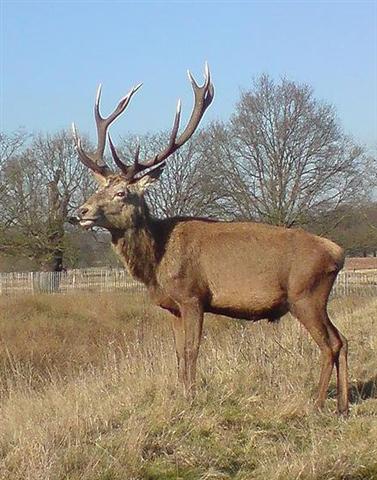
 |
 |
 |
  |
|
kahi |
| Kahi.
Tuna; two sorts:
kahi aveave, kahi
matamata. Vanaga.
Mgv.: kahi, to
run, to flow. Mq.:
kahi, id. Churchill.
Rangitokona, prop
up the heaven! //
Rangitokona, prop up
the morning! // The
pillar stands in the
empty space. The thought
[memea] stands in
the earth-world - //
Thought stands also in
the sky. The kahi
stands in the
earth-world - // Kahi
stands also in the sky.
The pillar stands, the
pillar - // It ever
stands, the pillar of
the sky. (Moriori
creation myth according
to Legends of the South
Seas.) |
|
 |
|
Tahi. Other;
te tahi tagata
someone else; te tahi
hoki ... and others
again...; te tahi...
te tahi..., some...
others; te tahi atu,
the rest of them.
Tahitahi, to scrape
with a sharpened stone.
Vanaga. One, only,
simple; te tahi,
next; e tahi,
anyone; e tahi no,
unique, unity; e tahi
e tahi,
simultaneous. P Mgv.:
Mq., Ta.: tahi,
one. Churchill. |
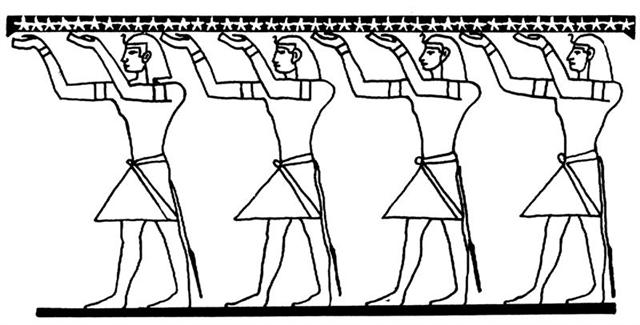
|

















